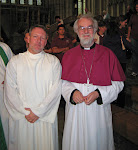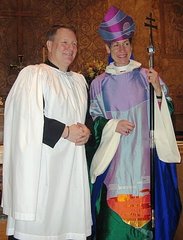Here's an excerpt from a paper I wrote for Systematic Theology on Ecclesiology. Posting a paper is pretty lame even for a seminarian. But, hey, if you're really cool you don't even have a blog...
“If there is a communion in the eternal life of God and God wills us to share in that communion, then questions regarding the nature of the church and its mission, far from being a matter of secondary importance to the understanding of Christian faith, are quite central” (Migliore, 248).
The centrality of this idea of community is at odds with American individualism and the influence of American motifs within the church and in the larger culture. Migliore writes, “In much of white North American Christianity, (individualism) translates into a self-centered piety in which church is quite secondary or entirely optional” (Migliore, 249).
This individualism is rooted both in radical reformation Protestantism and in American myths of democracy and opportunity for all. This individualistic orientation is further bolstered by the Vietnam/Watergate era’s mistrust of establishment institutions. Rejection of institutions such as the church has replaced hopes for their reformation in much of American conventional thought and discourse. However, we find intentional communities growing up around social networking Internet sites and celebrities such as Oprah Winfrey. Migliore sees a “profound hunger for companionship and community… (running) beneath the surface of life in America” (Ibid). Mainstream Christian communities once met this need and should strive to do so again.
Though the church may, with confidence, call Christians into community, it has never been entirely successful in realizing that community within itself. The 21st century Christian church is divided into East and West. There are finer distinctions that divide the church into communions, national bodies, confessions and denominations. The necessity that the church should be a community, a true assembly of believers as Migliore and Bonhoeffer so eloquently extol, is poorly represented by the reality of the church. Acts tells of dissension over ecclesiastical matters in the earliest days of the church which are mirrored in countless other divisions throughout Christian history. As Avery Dulles writes, “There is a contradiction between the essential unity of the church and its empirical disunity” (Dulles, 241).
Is the church, then, a failure? Not a failure per se, but something that is not yet complete. The church’s perfection is to be found in the fully realized kingdom of God and not in its own existence. As James W. McClendon, Jr. writes, “The upshot is that, in a sense not true of other doctrines of the faith, Christian ecclesiology is provisional ecclesiology; it looks forward toward a fulfillment not yet achieved. Migliore concurs. “The church is a concrete sign and provisional realization of new community with God and with one another through Jesus Christ in the spirit” (Migliore, 263). The church’s accomplishments can only be provisional until they are completed in the coming kingdom of God.
But more than awaiting God’s return, the church’s existence prefigures and anticipates it. Migliore writes, “While by no means identical with the coming reign of God, the Church’s proclamation and practice are to be witness to and an anticipatory participation in God’s reign” (Migliore, 263). Eschatological anticipation is closely linked with the communitarian life of the church in Bonhoeffer’s view as well. “So, between the death of Christ and the Last Day it is only by a gracious anticipation of the last things that Christians are privileged to live in visible fellowship” (Bonhoeffer, 18). For Dulles, the brokenness of the church when considered through the lens of Christian hope guarantees an eventual wholeness. He writes, “(T)he church as a community of hope means that the church now possesses fragmentarily that unity to which it is called. But this foretaste is the promise and guarantee that the church’s hope for the perfection of its unity will be fulfilled” (Dulles, 242).
One might conclude that since eschatological hope by definition cannot be fully realized by the church it, the efforts to make whole the community of the church, as evidenced in the ecumenical efforts of the 20th century, should be abandoned. By no means, asserts McClendon. “The fact that we await fulfillment at the day of the Lord should foster, not prevent, whatever can be realized now” (McClendon, 337). We are to meet Christ like the wise bridesmaids, with lamps full of the fruits of our work towards full, complete unity within his church.
The church, then, is called to reflect the present reality of God -- triune and incarnate -- in its identity as a community. We are not to go it alone as Christians, but to try, however ineffectually, to manifest our belief in Christ within some sort of community and communion with others who also believe. Our efforts to do so will always fall short. We must, per the tenets of the 12 step recovery movement, strive always for progress and never expect perfection of our own accord. As we are necessarily called into community by God, our community will necessarily be incomplete. But our faith carries within it an eschatological hope for completion. McClendon writes, “God has only begun to do what God will do” (McClendon, 344). There is a future reality that God has yet to bring into being, and that as yet unfulfilled potential is reflected in the incomplete community that the Christian church comprises. But our very nature, our communitarian identity itself, guarantees that, in the eschaton we will be made one ecclesia in the risen Christ.
Works Cited:
Bonhoeffer, Dietrich. Life Together. San Francisco: HarperCollins Publishers, 1954.
Dulles, Avery. Models of the Church. New York: Image, 1991.
McClendon, Jr., James W. Doctrine: Systematic Theology, Volume II. Nashville, TN: Abingdon Press, 1994.
Migliore, Daniel L., Faith Seeking Understanding: An Introduction to Christian Theology. Grand Rapids, MI: Eerdmans, 2004.
23 December 2006
What's a church FOR anyway???
Subscribe to:
Post Comments (Atom)







No comments:
Post a Comment